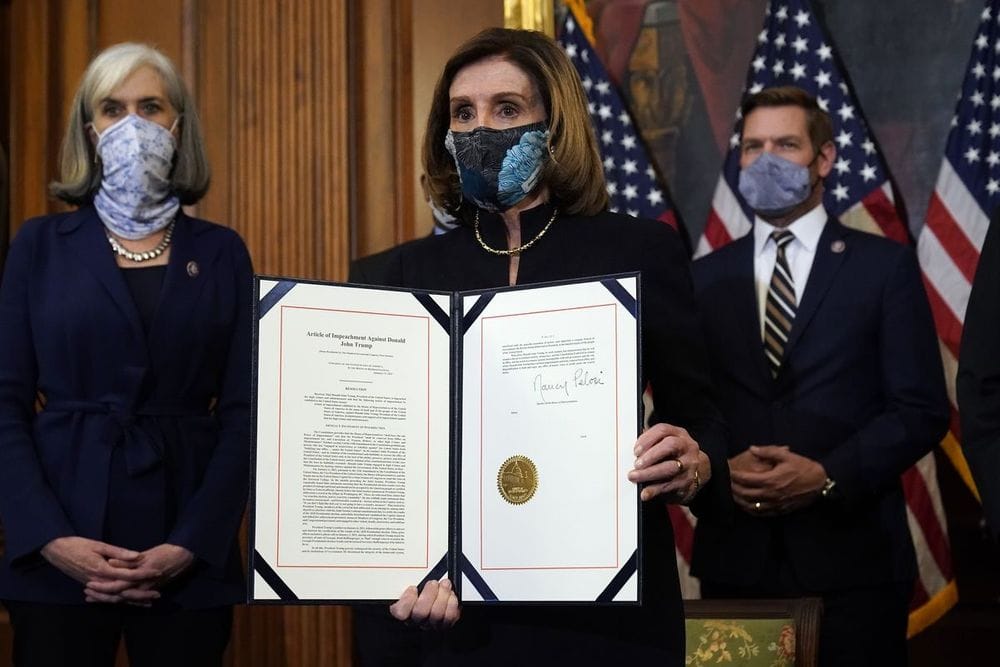President Donald Trump Impeached Twice, AI’s Role in COVID-19 Mutations, 5G and Health Care
January 14, 2021 — On Wednesday, House Speaker Nancy Pelosi announced the historic second impeachment of the 45th president of the United States Donald Trump by the House of Representatives. The House charged him of “incitement of insurrection” of the pro-Trump mob that attacked and briefly occupied

January 14, 2021 — On Wednesday, House Speaker Nancy Pelosi announced the historic second impeachment of the 45th president of the United States Donald Trump by the House of Representatives. The House charged him of “incitement of insurrection” of the pro-Trump mob that attacked and briefly occupied the Capitol last week
In her statement, Pelosi said: “In a bipartisan way, the house demonstrated that no one is above the law, not even the president of the United States.” She continued, saying that “Trump is a clear and present danger to our country” and that members of Congress actions were in an attempt to honor their oath of office “to protect and defend the Constitution of the United States.”
There seems to be limited pushback from the Senate as they prepare to fulfill their responsibility to conduct a trial to convict, i.e. remove or bar from future office. Some senators said that even if Trump is out of the office, precedent demands that they continue with the process.
The House’s second impeachment is significantly different from the first one. First is the unavailability of the president to speak on Twitter. Second, there is no apparent coordinated defense coming from the White House.
Indeed, no official statement released has been released from the White House about the impeachment.
Artificial Intelligence’s role in the creation of vaccines and prevention of mutations of the coronavirus
On a panel hosted by The Washington Post, Andrew Hopkins, CEO of Exscienctia said that artificial intelligence is vital to help discover new vaccines.
Normally when developing a vaccine, the timeframe is expected to be five to six years, but when developing a vaccine to fight COVID-19, that timeframe was reduced to less than 12 months.
AI has improved the process. Drugs are precision-engineered technology, and their assembling is based on billions of potential design decisions. Allowing AI to create such a design results in fewer experiments, accelerated speed and lower costs.
Ziad Obermeyer, associate professor of health policy and management at UC Berkeley School of Public Health, highlighted the importance of an algorithmic data approach to fighting the pandemic..
AI is not only a solution for getting better data on where the current pandemic is or it isn’t, but also to build our understanding of underlying biological and social contributions of it, he said.
According to panelists, the best productivity is performed when combining human strategic oversight expertise with AI, for the tactical heavy lift.
Also speaking on the Washington Post panel, Eric Topol, founder and director of Scripps Research Translational Institute, said that with the quickly spreading variants of the virus compared to the time frame of the vaccination, mutations will be widely infectious to the population.
These variants are affecting testing and there is currently a need for interference by tech businesses to provide a better supply of re-agents, more genomics sequencers, more analytics, and more people. The next 6 to 8 weeks will be crucial to controlling these mutations of the virus.
Kimberly Powell vice president of Health Care Nvidia said that the role technology is playing in combating disease are substantive.
Nividia partnered with Oxford Nanopore Technologies and developed a reagent technology with sequencers that are an alternative to COVID-19 testing.. Thanks to the use of AI, very quick adjustments to a computational platform can be made, that now has to react to a new chemical input for the virus and it can be defined in a shorter time and updated, as an alternative for prognosis.
The algorithm can abound to deal with a lot of the treacherous happenings in the treatment of patients and help overloading health care system.
In hospitals, AI is better used in the treatment of disease states, and in collaborative ways with health workers to spend more time with patients. Systems are not prepared to make complex decisions, and this is a work done by the health clients and health workers, said Everett Cunningham, president and CEO of GE Healthcare to the U.S. and Canada.
Using 5G and AI to make the ecosystem of health care come alive
Essential technologies are revolutionizing health care innovation in different industries, from genetics and mixed realities to the world of spatial computing, said CES 2021 panelists.
President of Myriad Genetic Laboratories Nicole Lambert said that trust is at an all-time high. With the promise of better outcomes, empowering choices can be made to the course of many diseases. With personalized medicine, what before was seen as incurable, now has become possible to cure.
Precision medicine is going to get more precise, as the demographic, that is undergoing, it allows people to plan for addressing risks for upcoming hereditary disease. Eliminating late-stage disease and, eliminating trial and error.
Ashley Tuan of Mojo Vision talked about an invisible future made possible by invisible computing. This technology started as a way to help the visually impaired and has grown to higher applications.
Clients feel in a natural way the assistance of technology. The new contact lens will have motion sensors inside it, focusing on functionality and tracking eye movement to fabricate an image properly, creating a sense of virtual reality.
Adam Pellegrini from SVP said that the center of all innovations has been surrounded and focused on consumer needs. A product launched called Symphony, a health hub for seniors to connect with family and friends, was created to support seniors at home.. This service provides a variety of assistance, creating an experience in the home around the consumer. Bringing them home to virtual care.









Member discussion